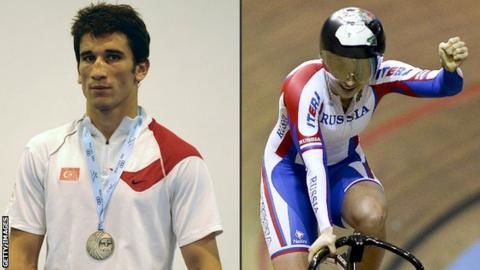
A Turkish boxer and a Russian cyclist have been provisionally suspended after doping samples from the London 2012 Olympics returned positive retests.
Boxer Adem Kilicci and track cyclist Yekaterina Gnidenko both tested positive for steroids, their sports’ governing bodies said on Thursday.
Olympics chiefs announced last week that 23 competitors at the London Games had failed retrospective doping tests.
Retests focused on athletes who could compete at this summer’s Rio Olympics.
The International Boxing Association (AIBA) said Kilicci had qualified for Rio, while Gnidenko is not listed on the Russian national team squad list for this season.
Kilicci, 30 – who lost in the quarter-finals of the middleweight division in London – and the Turkish boxing federation have been notified of the findings and his suspension.
AIBA said it is working with the World Anti-Doping Agency (Wada) “to ensure that boxing is doping-free”.
The Turkish Olympic Committee (TOC) said it was “extremely disappointed” by Kilicci’s positive retest.
“The TOC has a zero tolerance policy on doping and any form of cheating in sport and our primary objective is to protect clean athletes,” it said in a statement.
“We will now follow the official procedure and will announce appropriate action in due course. In the meantime, we are redoubling our efforts to encourage more rigorous testing in parallel with greater education of all athletes and their entourages throughout Turkish sport.
“The TOC fully supports the IOC and Wada’s actions in their drive to clean up world sport and we are determined to play our part in this fight.”
Russia’s Gnidenko, 23, competed in the women’s sprint and keirin at the 2012 Games without winning a medal.
The International Cycling Union said Gnidenko’s case “is the only positive the IOC passed on to us from the Beijing and London batches”.
The Russian Olympic Committee said eight of its athletes were among the 23 to have failed retrospective doping tests from London.
Thirty-one athletes – 14 from Russia – also failed tests when 454 samples from Beijing 2008 were retested.
IOC official warns against ‘Cold War’
Meanwhile, IOC board member Patrick Hickey fears Russia’s continued exclusion from competition could create a “Cold War situation”.
Last November, governing body the IAAF suspended Russia for alleged doping.
The IAAF council meet on June 17 to decide if Russia should be allowed to compete in this year’s Rio Olympics.
“I think it would be very negative if Russia is banned and I’d be very much in favour of finding a way to protect clean athletes in Russia,” Hickey said.
“We don’t want to see anything happen which could drive us back into a Cold War situation. We cannot punish the clean athletes.”



